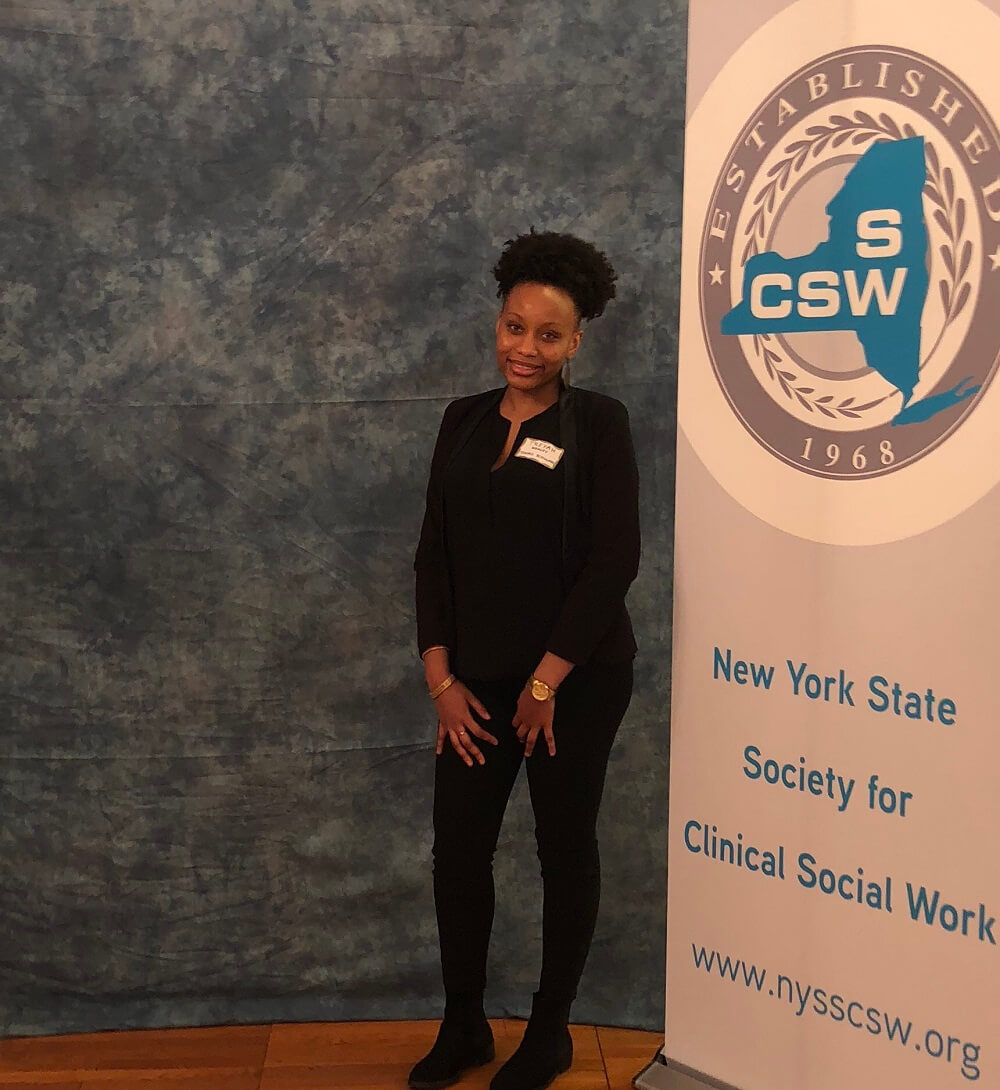GSSW Student Wins 2018 Diana List Cullen Memorial Scholarship
Tkeyah Whaley Discusses Social Work and Her Winning Essay

Touro College Graduate School of Social Work (GSSW) student Tkeyah Whaley received the 2018 Diana List Cullen Memorial First Year MSW Student Writing Scholarship from The Metropolitan Chapter of the New York State Society for Clinical Social Work. For her application, Whaley submitted her paper, "Micro Client Systems: Concepts into Practice,” which she completed for her Foundations of Social Work Practice 1. The award comes with a $500 scholarship and a one-year student membership to the society. In her winning essay, Whaley discussed developing therapeutic alliances with her clients as well as a specific instance where she dealt with a challenging client. We spoke with Whaley about her essay and her decision to become a social worker.
How did you decide to become a social worker?
I initially thought I wanted to become a psychologist. But then I took a great class called Intro to Social Work. I loved the class; I loved the values that drive social work. The professor became a mentor to me and he encouraged me to pursue a career in social work. I love my classes at Touro College Graduate School of Social Work (GSSW).
What are the values in social work that appeal to you?
Social work is heavily focused on compassion and empathy. While I always felt that I was a compassionate and empathetic person, I feel that I’ve learned more about how to practice both values. The idea of practicing compassion and empathy might sound weird, but it is something that requires practice.
It’s one thing to say, “I want to help people,” but it’s another thing to be in a place where you can help people. So far, my field placements have been challenging but that’s what strengthened my attachment to the field. I know I’m passionate about helping people, but, like everyone else, I have my own biases and I need to challenge them in order to learn how to help all types of people.
What were the internships you had?
My first-year internship was in a mental health clinic. I was an intake coordinator and I had a caseload. I performed one-on-one therapy. The internship was great because I was able to do clinical work in my first year. Currently, I’m working with the homeless population in a transitional housing facility. Many of my clients also have substance abuse issues.
What did you write about for your essay?
I wrote about my experience doing therapy, focusing on the skills I used including engagement, assessment and building rapport. The second part of my essay focused on a challenge I faced. I had an aggressive client who belittled me and demeaned me. I wrote about how I felt diminished by him, but how I managed to maintain my core social work values and keep my client’s best interests at heart. I spoke about the challenge in an open and honest way. I wrote about my own personal bias against the client since he had a history of domestic abuse, but I had to put that aside and keep his interests in the forefront.
How did you deal with that client?
I realized I couldn’t judge him based on what he did and that his actions in the past don’t shape who he is now. I knew he was in therapy and I focused on how I could help him with the way he expressed his anger. I realized that he was coming here because he needed help and the only way I could help him was by suspending my own judgment. The goal of social work is to help someone, not judge them based on their past.
The experience helped me reflect a lot about my own personal judgments and biases. In addition, the client was also very judgmental of me. He didn’t think I had enough experience to help him; he told me I wasn’t legitimate. That was a challenge too, and though I felt personally attacked throughout our relationship, I maintained my core social work values and didn’t let it rattle me. I gave no indication of how it affected me, and my supervisor praised me for maintaining my composure.
What do you think is the most essential trait for being a successful social worker?
Empathy, the ability to put yourself in someone else’s shoes. Empathy is different than sympathy. Sympathy means “I feel sorry for you,” while empathy is feeling what the other person is going through. That’s why empathy is so important for a social worker: It makes you ask what services and help you would want if you were in that situation. It also helps to be a great listener.

